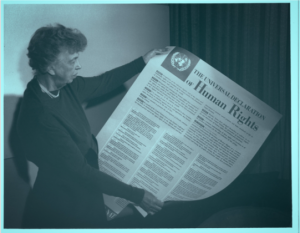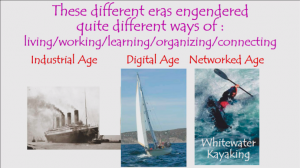This year, the Universal Declaration of Human Rights (UDHR) celebrates its 70th anniversary.
“Where, after all, do universal human rights begin? In small places, close to home–so close and so small that they cannot be seen on any maps of the world.” — Eleanor Roosevelt (chair of the UDHR drafting committee)
On December 10, 1948, the Universal Declaration of Human Rights (UDHR) was adopted by the United Nations. The first document to outline the need for universal protection of fundamental human rights, the declaration consists of thirty articles that paved the way for numerous international treaties, human rights movements, and national laws. The precursor to the International Bill of Human Rights, the UDHR provided more clarification to the United Nations Charter, a foundational treaty adopted in 1945 in the aftermath of World War II.
The structure and content of the declaration was compiled over time with contributions by John Peters Humphrey, René Cassin, and Code Napoléon, and was finalized to include a preamble and thirty articles outlined as follows:
“Article 1 All human beings are born free and equal.
Article 2 Everyone is entitled to the same human rights without discrimination of any kind.
Article 3 Everyone has the human right to life, liberty, and security.
Article 4 No one shall be held in slavery or servitude.
Article 5 No one shall be subjected to torture or cruel, inhuman or degrading treatment or punishment.
Article 6 Everyone has the human right to be recognized everywhere as a person before the law.
Article 7 Everyone is equal before the law and has the human right to equal protection of the law.
Article 8 Everyone has the human right to a remedy if their human rights are violated.
Article 9 No one shall be arrested, detained, or exiled arbitrarily.
Article 10 Everyone has the human right to a fair trial.
Article 11 Everyone has the human right to be presumed innocent until proven guilty.
Article 12 Everyone has the human right to privacy and family life.
Article 13 Everyone has the human right to freedom of movement and residence within the state, to leave any country and to return to one’s country.
Article 14 Everyone has the human right to seek asylum from persecution.
Article 15 Everyone has the human right to a nationality.
Article 16 All adults have the human right to marry and found a family. Women and men have equal human rights to marry, within marriage, and at its dissolution.
Article 17 Everyone has the human right to own property.
Article 18 Everyone has the human right to freedom of thought, conscience and religion.
Article 19 Everyone has the human right to freedom of opinion and expression.
Article 20 Everyone has the human right to peaceful assembly and association.
Article 21 Everyone has the human right to take part in government of one’s country directly or through free and fair elections and access to the public service
Article 22 Everyone has the human right to social security and to the realization of the economic, social and cultural rights indispensable for dignity.
Article 23 Everyone has the human right to work, to just conditions of work, to protection against unemployment, to equal pay for equal work, to sufficient pay to ensure a dignified existence for one’s self and one’s family, and the human right to join a trade union.
Article 24 Everyone has the human right to rest and leisure.
Article 25 Everyone has the human right to a standard of living adequate for health and well-being, including food, clothing, housing, medical care and necessary social services.
Article 26 Everyone has the human right to education including free and compulsory elementary education and human rights education.
Article 27 Everyone has the human right to participate freely in the cultural life and to share in scientific progress, as well as to protection of their artistic, literary or scientific creations.
Article 28 Everyone is entitled to a social and international order in which these rights can be realized fully.
Article 29 Everyone has duties to the community.
Article 30 None of the human rights in this Declaration can be used to justify violating another human right.” [1]
The UDHR is responsible for influencing over eighty international declarations and treaties for human rights and in 1999, the UDHR broke the record for most translated document in the world. To date, it has been translated into more than 500 languages. [2]
_______________________________________________________
Visit the “United Nations Association of the United States of America” for more information on what resources are available for educational purposes, and which events are being held in your area.
http://www.unausa.org/programs/human-rights
Visit the International Federation of Libraries Association (IFLA) website to see what is happening on Human Rights Day 2018 (December 10). You can also follow their blog and even download a free “Libraries for Human Rights” poster.
https://www.ifla.org/node/91728
__________________________________________________
References
[1] “Universal Declaration of Human Rights (Summary)”, People’s Movement for Human Rights Learning (PMHR), 2018, http://www.etc-graz.at/typo3/fileadmin/user_upload/ETC-Hauptseite/Menschenrechte_lernen/POOL/UDHR_Short_version.pdf.
[2] Lee, Jenni. “About the Universal Declaration of Human Rights”, United Nations Foundation, 8 December 2017, https://unfoundation.org/blog/post/universal-declaration-human-rights/.
________________________________________________________
Resources on Human Rights
Bellamy, Alex J. The Oxford Handbook of the Responsibility to Protect. Oxford, Oxford University Press, 2016.
Cahill, Suzanne. Dementia and Human Rights. Bristol, Policy Press, 2018.
Devere, Heather. Peacebuilding and the Rights of Indigenous Peoples: Experiences and Strategies for the 21st Century. Cham, Springer, 2017.
Holcombe, Sarah E. Remote Freedoms: Politics, Personhood, and Human Rights in Aboriginal Central Australia. Stanford, Stanford University Press, 2018.
Lindkvist, Linde. Religious Freedom and the Universal Declaration of Human Rights. Cambridge, Cambridge University Press, 2017.
Loeffler, James Benjamin. Rooted Cosmopolitans: Jews and Human Rights in the Twentieth Century. New Haven, Yale University Press, 2018.
Mayer, Ann Elizabeth. Islam and Human Rights: Tradition and Politics. Boulder, Westview Press, 2012.
Plesch, Daniel. Human Rights after Hitler: the Lost History of Prosecuting Axis War Crimes. Washington, D.C., Georgetown University Press, 2017.
Ten Years of the Implementation of the United Nations Declaration on the Rights of Indigenous Peoples: Good Practices and Lessons Learned — 2007 – 2017: Report of the Expert Mechanism on the Rights of Indigenous Peoples. Geneva, United Nations General Assembly 2017. Continue Reading →



